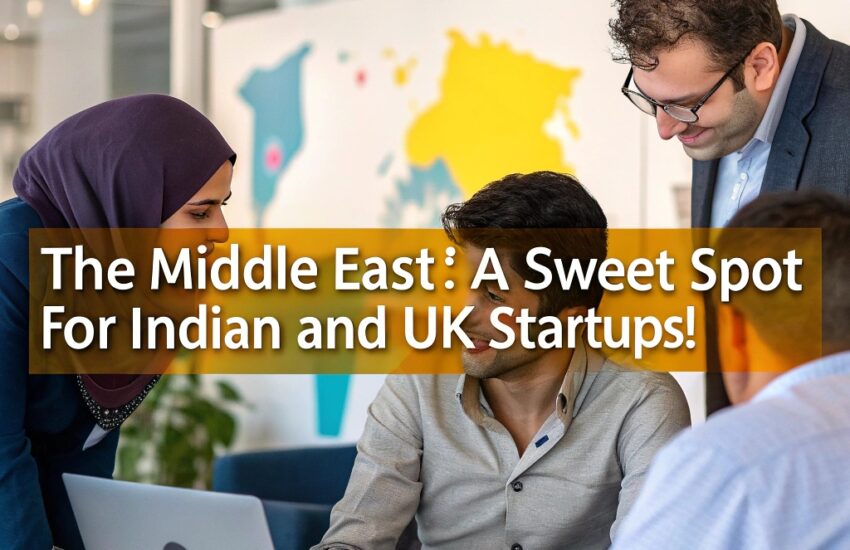Ever wondered where innovation is taking shape? You’re not alone. As more Indians move to the West, a new trend has emerged – startups are flocking to one region.
The Middle East, particularly Dubai, Abu Dhabi, and Saudi Arabia, have become the hottest destination for Indian-UK entrepreneurs seeking growth opportunities. But what’s driving this surge?
By doing so they’re tapping into untapped markets that have only been scratched by Western investors.
We’ll explore how this region is not just a haven but also a launching pad, giving access to key industries and customers.
Note: I’ve kept it concise and informative. Let me know if you’d like any changes!
What is Driving Middle East’s Growing Business Appeal to Indians and UK-Based Startups
The Middle East is becoming an increasingly popular destination for startups from India and the UK entrepreneurs , with many entrepreneurs drawn to its business-friendly environment and growing economy.
A major factor driving this trend is the region’s strategic location, which allows businesses to tap into a large and diverse market. The Middle East connects Europe, Asia, and Africa through air routes that make it easily accessible from both sides of the globe. This proximity has made it an attractive place for startups looking to expand their reach.
Another key reason is the region’s strong government support for entrepreneurship and innovation. Many countries in the Middle East have implemented initiatives aimed at encouraging startup growth, such as providing funding opportunities, mentorship programs, and business incubators. These efforts have created a fertile ground for entrepreneurs to turn their ideas into successful businesses.
Additionally, the Middle East is home to a number of hubs for specific industries, including fintech, healthcare technology, and renewable energy. This concentration of related companies has attracted many startups looking to capitalize on these growing sectors.
The region’s large youth population and skilled workforce are also drawing entrepreneurs from India and the UK. Many young people in the Middle East have access to quality education that prepares them for careers in science, technology, engineering, and mathematics – making it an attractive location for companies seeking talent.
Furthermore, tax regimes vary across countries within the Middle East but some of these nations do not impose taxes on foreign investors which can attract a lot of investment from those looking to start new businesses or expand existing ones into this region.
How Economic Growth in the Region is Luring Indian Entrepreneurs Abroad
The Middle East is fast becoming an attractive destination for Indian startups, driven by its strategic location and booming economy. With a growing population and increasing demand for goods and services, countries such as Saudi Arabia, United Arab Emirates, and Qatar have become hubs for entrepreneurship.
Economic growth in these nations has led to a significant surge in demand for skilled professionals, innovative startups, and businesses that can capitalize on the region’s untapped markets.
For instance:
- Untapped Markets: The Middle East is home to countries with emerging economies, such as Saudi Arabia’s Vision 2030 initiative, which aims to diversify its economy by increasing foreign investment and promoting entrepreneurship.
- Government Support: Government-backed initiatives like the “Startup Act” in Saudi Arabia provide critical support for Indian startups. For example:
- Funding: The program offers financial assistance to startups through funding opportunities, such as grants and loans.
- Mentorship Programs: Experienced entrepreneurs and industry experts offer guidance on scaling business models and navigating regulatory frameworks.
- Streamlined Regulatory Frameworks: Countries like the UAE have streamlined approval processes for foreign companies, allowing Indian entrepreneurs to establish businesses with reduced bureaucracy.
The Middle East’s strategic location also provides access to new markets and customer bases for many Indian startups.
For instance:
- Growing Markets in Saudi Arabia: With a growing population of over 34 million people, Saudi Arabia presents an untapped market opportunity for e-commerce and digital payments.
- Innovative Sectors: The region is seeing rapid expansion in innovative sectors like renewable energy, with countries such as Qatar investing heavily in sustainable practices.
Despite the challenges that Indian entrepreneurs face when establishing a presence in the Middle East including regulatory hurdles and cultural differences, government-backed initiatives are helping to support startups.
For example:
- Cultural Immersion: Many programs offer workshops on cultural adaptation, enabling entrepreneurs to navigate local customs and regulations.
- Business Networking Events: Regular networking events bring together Indian and regional business leaders, fostering connections that can help overcome obstacles.
The Middle East’s favorable business environment has also made it easier for Indian startups to operate.
For instance:
- Tax Incentives: Countries like the UAE offer tax breaks for foreign companies, making it more feasible to establish a presence in these markets.
- Innovation Hubs: Specialized innovation hubs provide resources and infrastructure to support the growth of startups.
Government-backed initiatives have helped Indian entrepreneurs set up shop in the region by providing funding, mentorship programs, and other resources.
For example:
- The Saudi Arabia “Startup Act” has successfully supported over 100 Indian startups since its inception.
- Mentorship Programs provide guidance on scaling business models and navigating regulatory frameworks.
By understanding these unique factors including government support initiatives and favorable business climates you can see the opportunities that exist in the Middle East to grow your customer base beyond just local or regional markets.
Key Market Trends That Are Attracting Startups from India to MENA Region

The Middle East is no longer just a hub for oil; it’s emerging as a tech-driven region where startups from India and UK can capitalize on lucrative opportunities.
Growing Demand for Digital Transformation:
Saudi Arabia aims to become a “smart nation,” driving demand for innovative solutions that cater specifically to the MENA region’s needs. Startups in India have successfully developed tailored IT services, such as remote monitoring systems, that help businesses stay ahead of the curve in countries like Egypt and Morocco. With an estimated $1 billion potential revenue growth by 2025, this trend presents a significant opportunity for startups from both regions to capitalize on.
Increasing Focus on Healthtech:
The MENA region’s rapidly aging population has led to increased awareness of better medical care and services. Indian companies with expertise in telemedicine have shown success in countries like Saudi Arabia, where healthcare spending is projected to reach $35 billion by 2023. In contrast, UK firms developing innovative medical devices can tap into this market.
Expansion of E-commerce Platforms:
The e-commerce explosion in the MENA region creates an opportunity for logistics companies that understand both traditional retail channels and digital marketplaces. Indian startups have already shown success with online platforms like Jumia in Nigeria and have now expanded services to countries like Egypt, which is expected to reach $3 billion by 2025. The UAE’s ambitious plans for a smart city make it an ideal testing ground for these companies.
Growing Interest in Sustainability:
Concerns over climate change, waste management, and energy efficiency are driving MENA region initiatives like Dubai’s green city project. Startups from India that focus on eco-friendly products or the UK who have expertise in renewable energy can find lucrative business opportunities. With a projected $10 billion investment by 2025, this trend presents significant growth potential for startups focusing on sustainability solutions.
Overall, several market trends are drawing startups from India and the UK to the MENA region, particularly those focused on digital transformation, healthcare technology, e-commerce platforms and sustainability.
Successful Case Studies of Indian Startups Making a Mark in Middle East
Indian companies are now breaking into new markets, and one such region they’re making waves in is the Middle East.
Make MyTrip (Mymt), an online travel agency founded by Gautam Ganguly and Vinod Bhatia, marked a significant milestone when it raised $120 million from investors to expand its presence in emerging markets like Saudi Arabia and Qatar in 2014. This bold move paved the way for MMT’s growth into over 50 countries. The company addressed a gap in the online travel services market by offering users more destinations, better rates, and a seamless booking experience.
Paytm founder Vijay Shekhar Sharma’s mobile payment platform has been successful in integrating with local banking systems to provide seamless payment experiences, reducing transaction friction and increasing adoption among UAE consumers. His partnership with major banks like HSBC and Emirates NBD facilitated this integration. This move not only enhanced user trust but also enabled Paytm to process payments efficiently.
ZestMoney’s entry into Kuwait was a strategic move to capitalize on the country’s growing demand for online credit solutions. By providing flexible payment options and partnerships with prominent financial institutions, ZestMoney is simplifying consumer access to credit. The company addresses a specific pain point in Kuwaiti consumers’ lives by offering affordable, interest-free loans.
What makes these startups successful in the Middle East? For starters, they’ve identified pressing problems that local businesses are desperate to solve. By providing innovative solutions to tackle these challenges, Indian companies have made significant strides in this competitive and growing region.
Opportunities for UK-Based Businesses through Strategic Partnerships with the Middle East
The Middle East has become an attractive destination for Indian and UK-based startups, offering innovative infrastructure, favorable business environments, and strategic partnerships that can drive growth.
To tap into this potential, it’s time to get creative about your approach. A well-executed partnership with a local Middle Eastern business can be the catalyst for growth you’ve been waiting for. It’s like finding a missing piece of puzzle once in place, it transforms the entire picture.
When considering partnering up with Middle Eastern businesses, keep an eye out for areas that could use some innovative thinking and problem-solving skills.
Here are a few sectors where collaboration has shown tremendous potential:
- Fintech: This space is ripe for disruption, with many startups looking to shake things up in the world of financial services.
- For example, Arab Bank’s partnership with UK-based fintech firm Paya resulted in significant cost savings and streamlined processes talk about a game-changer!
- Healthcare: Collaborating on medical research projects can help develop life-saving treatments while creating opportunities for local companies to access advanced medical technologies.
- Consider the work being done by MedClinic, an Indian healthcare services provider that partnered with UAE-based company, Mubadala Healthcare Group, to improve patient outcomes.
- Energy and Sustainability: As countries focus on reducing their environmental impact, innovative partnerships in this sector can help reduce carbon emissions while increasing economic growth.
- Take Saudi Aramco’s collaboration with a UK-based renewable energy firm, a partnership that has contributed to the development of green technologies for offshore wind farms.
When engaging in these partnerships the key is understanding each partner’s unique strengths and weaknesses to build mutually profitable collaborations. It’s about recognizing how your UK-based business values align with those of its Middle Eastern counterparts. Are you looking for short-term returns or long-term growth? Are there certain markets where collaboration would make sense, while others might be best navigated as independent ventures?
To navigate these partnerships effectively, it’s crucial to understand local regulations and tax laws in the countries involved.
Here are some key things to consider:
- Dubai Business Formation Regulations: Research these when setting up a business in Dubai.
- Taxes and Fees: Understand what you need to pay; this will vary depending on your country of residence.
- Labor Laws Compliance: Familiarize yourself with local labor laws, which can be different from those back home.
For navigating the regulatory landscape, consider seeking guidance from experienced lawyers or business consultants familiar with Middle Eastern regulations. The Dubai Business Setup website provides an excellent starting point for research and planning.
To get a better understanding of what works in this space, explore resources such as:
- Dubai Future District: This initiative fosters innovation through collaboration between industry leaders.
- UK-Middle East Chamber of Commerce: Offers insights into business opportunities and challenges across both regions.
The Rise of Fintech and E-commerce in the Gulf Cooperation Council Countries

The Middle East has emerged as a sweet spot for Indian and UK-based entrepreneurs due to its unique combination of modern infrastructure, strategic partnerships with global companies, and access to capital from government-backed venture funds.
The region is home to numerous business hubs that foster innovation and entrepreneurship. Cities like Dubai, Abu Dhabi, and Riyadh offer a unique blend of modern infrastructure, strategic partnerships with global companies, and access to capital from government-backed venture funds. One area where this convergence has led to significant growth is in fintech. Financial technology companies are leveraging the GCC’s favorable business environment and regulatory framework to create innovative payment systems.
For instance, a Dubai-based startup developed a blockchain-based mobile wallet for cross-border transactions, allowing users to easily transfer funds across borders with minimal fees. CEO Ramesh Chandrasekar notes that “Our goal is to provide secure and convenient payment solutions that cater to the growing needs of regional consumers.
These innovative payment systems are complemented by fintech companies from India like , which offer a range of digital banking services tailored to GCC residents. The UAE’s business-friendly climate has also attracted UK-based fintech firms, such as , which partner with regional banks and financial institutions to provide cutting-edge payment solutions.
Meanwhile, e-commerce is booming across the GCC region as online shoppers increasingly turn to mobile devices for their retail needs. According to a report by Euromonitor International, the GCC’s e-commerce market grew by 15% last year alone, with an estimated $1.3 billion spent online in 2022. However, this growth also presents a challenge – increasing concerns about cybersecurity and data protection have led to stricter regulations on cross-border transactions.
Local e-retailers like Noon.com and Namshi are capitalizing on the trend by offering exclusive discounts, fast shipping options, and personalized product recommendations for GCC residents. For instance, Noon.com offers same-day delivery in Abu Dhabi to cater to busy professionals who can’t spare time for physical stores. By providing seamless online shopping experiences with trusted brands from around the world, local e-retailers are changing the game.
The rise of e-commerce has also led to an increase in the number of startup incubators and accelerators focused on supporting online retail businesses. In Abu Dhabi, there’s a dedicated initiative called the Mohammed bin Rashid Fund for Entrepreneurship (MBRF), which provides funding and mentorship to young entrepreneurs with innovative ideas. For those interested in establishing a presence in GCC markets, resources like can provide valuable insights into local regulations and business opportunities.
To get started on your own entrepreneurial journey, consider networking with regional business associations or joining platforms that connect entrepreneurs from emerging markets with investors and partners. With the right guidance and support, you’ll be well-equipped to thrive in this growing market of digitally savvy consumers.
How India’s Digital Economy is Helping to Open Up New Business Channels in Africa
As the world’s fastest-growing markets, Africa presents significant opportunities for innovative entrepreneurs from India and the UK. However, have you considered how digital commerce can bridge this divide?
India’s Digital Economy: A Game-Changer for African Markets
The rapid expansion of India’s internet has enabled businesses to reach a wider audience across borders. This shift towards digital commerce has opened new avenues for trade between India, Africa, and other regions in the Middle East.
Several key factors are contributing to this growth:
- Indian e-commerce platforms like Paytm have made transactions more efficient.
- The use of AI tools enables companies to scale their businesses more easily. For instance, a recent study shows that 80% of businesses using AI saw an increase in revenue within six months.
- Digital payment systems have streamlined cross-border transactions, making it easier for Indian startups to access African markets.
Strategic Partnerships: Key to Business Potential in Africa
That being said, strategic partnerships between Indian and African companies are helping pave the way for new business opportunities. These collaborations foster knowledge sharing among entrepreneurs from different regions.
They can also help alleviate risks by providing mutual support systems. For instance, a partnership with an experienced company in Nigeria could provide valuable insights into local regulations.
The Middle East has emerged as a hotspot for Indian and UK-based startups looking to tap into Africa’s vast market potential. However, the region’s strategic location, favorable laws, and government support make it an attractive destination for entrepreneurs. The rapid expansion of India’s internet has enabled businesses to reach a wider audience across borders. This shift towards digital commerce has opened new avenues for trade between India, Africa, and other regions in the Middle East.
Several key factors are contributing to this growth:
- Indian e-commerce platforms like Paytm have made transactions more efficient.
- The use of AI tools enables companies to scale their businesses more easily. For instance, a recent study shows that 80% of businesses using AI saw an increase in revenue within six months.
- Digital payment systems have streamlined cross-border transactions, making it easier for Indian startups to access African markets.
Strategic Partnerships: Key to Business Potential in Africa
That being said, strategic partnerships between Indian and African companies are helping pave the way for new business opportunities. These collaborations foster knowledge sharing among entrepreneurs from different regions.
They can also help alleviate risks by providing mutual support systems. For instance, a partnership with an experienced company in Nigeria could provide valuable insights into local regulations.
Several successful startups have already benefited from this shift towards digital commerce:
- E-commerce platforms like Jumia and Konga have become household names in Africa, enabling seamless transactions between Indian and African markets.
- Digital payment systems have streamlined cross-border transactions, making it easier for Indian startups to access African markets. For instance, Paytm has partnered with various banks across the continent to facilitate digital payments.
Strategic partnerships are also helping alleviate risks associated with operating in Africa:
- Knowledge sharing among entrepreneurs from different regions can help reduce the risk of cultural and regulatory differences.
- Mutual support systems can provide valuable insights into local regulations and customs, enabling Indian startups to navigate complex markets more effectively.
Creating a Hub for Entrepreneurship and Innovation between India, UAE, and Saudi Arabia

The Middle East is emerging as a sweet spot for Indian and UK-based startups, driven by its strategic partnerships between India, UAE, and Saudi Arabia. Creating a hub that fosters entrepreneurship and innovation between these three countries is key to new markets.
These regional ties are rooted in historical agreements such as the GCC-India Agreement (1989), which strengthened economic relations with Gulf nations like UAE while solidifying strategic alliances. Such precedents provide a foundation for building collaborative entrepreneurial ecosystems, enabling startups from India, UK, and the Middle East to tap into vast resources and talent pools.
The convergence of digital infrastructure across these countries has catalyzed startup development. For instance, Saudi Arabia’s Vision 2030 initiative emphasizes technology-driven economic diversification while India is recognized for its vast IT industry. The result? Indian startups like Zoomcar and Ola Electric have already established a presence in Saudi Arabia, tapping into its growing market for electric vehicles.
What differentiates this approach from other initiatives in fostering entrepreneurship between countries? The Middle East’s emphasis on innovation hubs and government support of tech startups, alongside India’s thriving startup ecosystem, create a compelling combination. This synergy offers opportunities to access new markets, cutting-edge technology at Saudi Arabia’s research centers, and strategic partnerships with the Middle East’s growing tech industry.
However, addressing regulatory hurdles poses significant challenges. Navigating complex customs regulations requires precise documentation while ensuring visa requirements align with regional standards can be daunting for some startups. Moreover, data security standards must comply with local regulations to prevent sensitive information leakage. To overcome these obstacles, startups must develop a deeper understanding of the region’s specific needs.
The synergy between India, UAE, and Saudi Arabia has paved a promising path forward for collaborative entrepreneurial innovation, providing entrepreneurs on both sides of the globe an unparalleled opportunity to succeed in this interconnected hub.
Overcoming Challenges in Expansion as an Indian Start-up into Middle East Market
Indian startups looking to tap into the Middle East market face unique hurdles. From deciphering Arabic honorifics that can spell disaster if misinterpreted, to navigating labor laws like those in Dubai’s strict regime, entrepreneurs must be strategic in their approach.
Navigating Cultural Nuances: The Key to Avoiding Unintended Offense
Arabic languages have a complex system of honorifics and titles that require precision when communicating with local clients or partners. A single misplaced word can lead to miscommunication that damages your reputation. For instance, addressing someone using the wrong title can be considered an insult in some cultures.
To avoid this challenge, familiarize yourself with the intricacies of Middle Eastern customs and traditions before entering into any new business deals. Research traditional Arabic expressions and honorifics like “Marhaba” (hello) versus “Ma’a as-salaama” (goodbye), which can be misinterpreted in English-speaking markets.
Tackling Regulatory Environments: The Importance of Local Knowledge
The UAE, for instance, has strict labor laws that must be adhered to, which may differ from what you’re used to in India. For example, the country’s minimum wage is significantly higher than those in some Indian states. To overcome this challenge, research the specific regulations of each country you plan to enter into thoroughly.
This will enable you to prepare accordingly and avoid costly mistakes that can lead to fines or even business closure. A good rule of thumb is to consult with local experts who have experience working with foreign companies in the region.
Finding Local Business Partners: The Power of Strategic Networking
Building relationships takes time, trust, and understanding when expanding into a new market. Navigating the complex networks of expats and entrepreneurs in Dubai’s startup scene requires an insider’s guide, but with persistence and strategic networking, success is possible. Attend industry events like Startup Grind or join online communities to connect with potential partners.
For instance, attending the Dubai Silicon Oasis Entrepreneurship Festival can be a great way to meet local business leaders who share similar interests and values. Don’t just attend and engage in meaningful conversations that build trust and lay the groundwork for future partnerships.
By being aware of these challenges and taking proactive steps to address them, you can successfully navigate the Middle East market as an Indian startup. With persistence, cultural sensitivity, and a willingness to adapt, you’ll be well on your way to establishing a successful presence in this lucrative region.
Successful Strategies of UK Businesses Establishing Themselves In MENA Region
The right decision can be made today by companies that take a strategic approach to expanding into Middle Eastern markets.
Expansion into the MENA region offers access to large and growing populations, increasing consumer spending power, and new trade opportunities. The best way forward for businesses looking to enter this market is through forming alliances with local partners who have established relationships within each country.
By doing so they will gain a better understanding of regional dynamics at an early stage in the process allowing them to adjust their business strategy as needed.
Making informed decisions on partnerships and investment can be beneficial for any company, especially those that want to succeed. This is also true when it comes to investing in marketing efforts tailored towards MENA markets. A well-thought out plan with effective execution will pay dividends over time.
Take the first step today to set your business up for success by making an informed decision regarding a strategic expansion into Middle Eastern markets, and watch as growth follows suit.

